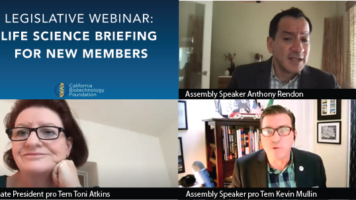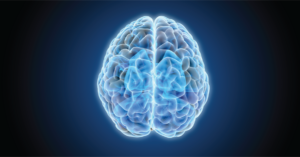Industry News
California Life Sciences Commemorates Mental Health Month
May 2021
During the month of May, the California Biotechnology Foundation commemorated Mental Health Awareness Month. Established by Mental Health America in 1949, the month has been used as a time to raise awareness of mental illness and to erase stigma and discrimination surrounding mental health conditions.
Mental illness can happen to anyone. It affects every ethnic, racial, cultural, economic and religious group, and impacts individuals of all ages and genders. Roughly 1 in every 5 adults and children – nearly 8 million Californians – will experience a diagnosable mental health issue during their lifetime. Research shows that two-thirds of those individuals may never seek professional help – despite a number of available therapies.
Just like cancer, diabetes or heart disease, mental illness is a treatable health condition and there are multiple treatments for issues such as anxiety, depression, bipolar disorder, schizophrenia, obsessive-compulsive disorders and others. Many companies within the biotech industry along with patient advocacy groups have made it part of their mission to develop treatments to help people gain a measure of control over these types of medical conditions.
While the development of new and effective treatments for patients with mental illness can be very complex and challenging, researchers are working to design gene-based treatments and therapies which target the fundamental causes of mental illness with minimal side effects. This exciting research will aid in the development of brain disorder diagnostics, medicines, treatments, vaccines and possibly a cure. There are currently more than 138 innovative potential new medicines which include:
- A dopamine/norepinephrine reuptake inhibitor in development for attention-deficit/hyperactivity disorder (ADHD).
- An oral combination of two therapeutics which target distinct receptors in the central nervous system for the treatment of treatment-resistant major depressive disorder.
- A neuroactive nasal spray developed from compounds called pherins, for the treatment of anxiety disorder.
- A potential first-in-class treatment for cognition impairment associated with a number of neurological and psychiatric diseases, including schizophrenia.
CBF also wants to acknowledge some of the patient advocacy organizations who are working tirelessly for people living with mental illness and their families during this important month:
Mental Health America in California
NAMI California
Steinberg Institute
California Consortium of Addiction Programs and Professionals
Mental Health California
Learning More About Tardive Dyskinesia
As part of this past Mental Health Month, California and about half of U.S. states recognized the first week of May as Tardive Dyskinesia Awareness Week. This is in part because few people know about the condition and many do not recognize it, even though Tardive Dyskinesia (TD) impacts approximately 600,000 people in the U.S.
TD is a condition of uncontrollable movements affecting the face, torso, and/or other body parts that may develop after a few months of taking certain medications to treat bipolar disorder, depression, or schizophrenia. The uncontrollable movements of TD may be disruptive to people’s lives due to the symptoms themselves and the impact they can have on emotional and social well-being – especially in conjunction with the effects of an underlying mental health condition.
Currently, there are two FDA-approved treatments for TD including valbenazine from San Diego-based Neurocrine Biosciences and deutetrabenazine from Teva Neuroscience, Inc., with many more on the horizon.
With the conclusion of Mental Health Month, it is important that the community continues to acknowledge and recognize the symptoms of TD so people can better understand the condition and help individuals with TD get the necessary support available. For more information visit:
National Institute of Neurological Disorders and Stroke
Movement Disorders Policy Coalition
Talk about TD
For more information, contact Patty Cooper with the California Biotechnology Foundation at 916-764-2434 or [email protected].



